Piano Sheet Music
 "Sometimes it's the mistakes that end up leading you into new territory .. like the guitar solo on 'Peelin' Taters' - I had some speaker problems, but the tone ended up sounding better than if I had new speakers .. it's a 60's Nashville, 'uptown' thing" Junior Brown
"Sometimes it's the mistakes that end up leading you into new territory .. like the guitar solo on 'Peelin' Taters' - I had some speaker problems, but the tone ended up sounding better than if I had new speakers .. it's a 60's Nashville, 'uptown' thing" Junior Brown
Frank Zappa
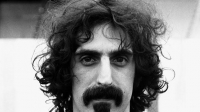
Frank Vincent Zappa Jr. American guitarist, singer, composer. He was born a Sicilian father and a Franco-Italian mother.
Date of birth: December 21, 1940, Baltimore, Maryland, United States Date and place of death: December 4, 1993, Hollywood Hills, Los Angeles, California, USA
Date of birth: December 21, 1940, Baltimore, Maryland, United States Date and place of death: December 4, 1993, Hollywood Hills, Los Angeles, California, USA
Guiseppe Verdi

Giuseppe Fortunino Francesco Verdi (Italian pronunciation: ; 10 October 1813 – 27 January 1901) was an Italian Romantic composer, mainly of opera. He was one of the most influential composers of the 19th century. His works are frequently performed in opera houses throughout the world and, transcending the boundaries of the genre, some of his themes have long since taken root in popular culture - such as "La donna è mobile" from Rigoletto, "Va, pensiero" (The Chorus of the Hebrew Slaves) from Nabucco, "Libiamo ne' lieti calici" (The Drinking Song) from La traviata and the "Grand March" from Aida. Although his work was sometimes criticized for using a generally diatonic rather than a chromatic musical idiom and having a tendency toward melodrama, Verdi’s masterworks dominate the standard repertoire a century and a half after their composition.
Verdi's predecessors who influenced his music were Rossini, Bellini, Giacomo Meyerbeer and, most notably, Gaetano Donizetti and Saverio Mercadante. With the exception of Otello and Aida, he was free of Wagner's influence. Although respectful of Gounod, Verdi was careful not to learn anything from the Frenchman whom many of Verdi's contemporaries regarded as the greatest living composer. Some strains in Aida suggest at least a superficial familiarity with the works of the Russian composer Mikhail Glinka, whom Franz Liszt, after his tour of the Russian Empire as a pianist, popularized in Western Europe.
Throughout his career, Verdi rarely utilised the high C in his tenor arias, citing the fact that the opportunity to sing that particular note in front of an audience distracts the performer before and after the note appears. However, he did provide high Cs to Duprez in Jérusalem and to Tamberlick in the original version of La forza del destino. The high C often heard in the aria Di quella pira does not appear in Verdi's score.
Verdi's predecessors who influenced his music were Rossini, Bellini, Giacomo Meyerbeer and, most notably, Gaetano Donizetti and Saverio Mercadante. With the exception of Otello and Aida, he was free of Wagner's influence. Although respectful of Gounod, Verdi was careful not to learn anything from the Frenchman whom many of Verdi's contemporaries regarded as the greatest living composer. Some strains in Aida suggest at least a superficial familiarity with the works of the Russian composer Mikhail Glinka, whom Franz Liszt, after his tour of the Russian Empire as a pianist, popularized in Western Europe.
Throughout his career, Verdi rarely utilised the high C in his tenor arias, citing the fact that the opportunity to sing that particular note in front of an audience distracts the performer before and after the note appears. However, he did provide high Cs to Duprez in Jérusalem and to Tamberlick in the original version of La forza del destino. The high C often heard in the aria Di quella pira does not appear in Verdi's score.
Eva Cassidy
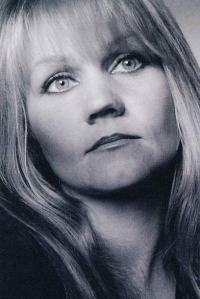
Eva Marie Cassidy (February 2, 1963 – November 2, 1996) was an American vocalist known for her interpretations of jazz, blues, folk, gospel, country and pop classics. She released her first album The Other Side, a set of duets with go-go musician Chuck Brown in 1992 followed by a live solo album, Live at Blues Alley in 1996. Cassidy was virtually unknown outside her native Washington, DC when she died of melanoma in 1996.
Four years later, Cassidy's music was brought to the attention of UK audiences when her versions of "Over the Rainbow" and "Fields of Gold" were played on BBC Radio 2. Following the overwhelming response, a camcorder recording of "Over the Rainbow" taken at the Blues Alley was shown on BBC Two's Top of the Pops 2. Shortly after, the compilation album Songbird, climbed to the top of the UK Albums Charts, almost three years after its initial release. The chart success in the United Kingdom led to increased recognition worldwide; as of 2003, her posthumously released recordings, including three UK #1s, have sold around six million copies. Her music has also charted top 10 positions in Australia, Germany, Sweden, Norway and Switzerland.
Four years later, Cassidy's music was brought to the attention of UK audiences when her versions of "Over the Rainbow" and "Fields of Gold" were played on BBC Radio 2. Following the overwhelming response, a camcorder recording of "Over the Rainbow" taken at the Blues Alley was shown on BBC Two's Top of the Pops 2. Shortly after, the compilation album Songbird, climbed to the top of the UK Albums Charts, almost three years after its initial release. The chart success in the United Kingdom led to increased recognition worldwide; as of 2003, her posthumously released recordings, including three UK #1s, have sold around six million copies. Her music has also charted top 10 positions in Australia, Germany, Sweden, Norway and Switzerland.
George Gershwin

George Gershwin (September 26, 1898 – July 11, 1937) was an American composer. He wrote most of his vocal and theatrical works in collaboration with his elder brother, lyricist Ira Gershwin. George Gershwin composed songs both for Broadway and for the classical concert hall. He also wrote popular songs with success.
Many of his compositions have been used on television and in numerous films, and many became jazz standards. The jazz singer Ella Fitzgerald recorded many of the Gershwins' songs on her 1959 Gershwin Songbook (arranged by Nelson Riddle). Countless singers and musicians have recorded Gershwin songs, including Fred Astaire, Louis Armstrong, Al Jolson, Bobby Darin, Art Tatum, Bing Crosby, Janis Joplin, John Coltrane, Frank Sinatra, Billie Holiday, Sam Cooke, Miles Davis, Herbie Hancock, Madonna, Judy Garland, Julie Andrews, Barbra Streisand, Marni Nixon, Natalie Cole, Patti Austin, Nina Simone, Maureen McGovern, John Fahey, The Residents, Than & Sam, Sublime, and Sting. A residential building is named after him on the Stony Brook University campus.
Many of his compositions have been used on television and in numerous films, and many became jazz standards. The jazz singer Ella Fitzgerald recorded many of the Gershwins' songs on her 1959 Gershwin Songbook (arranged by Nelson Riddle). Countless singers and musicians have recorded Gershwin songs, including Fred Astaire, Louis Armstrong, Al Jolson, Bobby Darin, Art Tatum, Bing Crosby, Janis Joplin, John Coltrane, Frank Sinatra, Billie Holiday, Sam Cooke, Miles Davis, Herbie Hancock, Madonna, Judy Garland, Julie Andrews, Barbra Streisand, Marni Nixon, Natalie Cole, Patti Austin, Nina Simone, Maureen McGovern, John Fahey, The Residents, Than & Sam, Sublime, and Sting. A residential building is named after him on the Stony Brook University campus.
Idina Kim Menzel

Idina Kim Menzel (/?'di:n? m?n'z?l/; born Idina Kim Mentzel; May 30, 1971) is an American actress and singer.
Menzel is known for her performance as the voice of Queen Elsa in the 2013 Disney film Frozen. Additionally, she portrayed the recurring role of Shelby Corcoran on the Fox musical comedy-drama TV series Glee, as well as Nancy in the 2007 Disney film Enchanted. Holiday Wishes (2014), her first album in six years, reached number six on the Billboard 200 albums chart. Menzel is the only competitive Tony Award-winning actress to ever reach the top 10 of the Billboard Hot 100. She performed a solo world concert tour from May to October 2015.
Menzel is known for her performance as the voice of Queen Elsa in the 2013 Disney film Frozen. Additionally, she portrayed the recurring role of Shelby Corcoran on the Fox musical comedy-drama TV series Glee, as well as Nancy in the 2007 Disney film Enchanted. Holiday Wishes (2014), her first album in six years, reached number six on the Billboard 200 albums chart. Menzel is the only competitive Tony Award-winning actress to ever reach the top 10 of the Billboard Hot 100. She performed a solo world concert tour from May to October 2015.
Ludwig van Beethoven

Ludwig van Beethoven (/ˈlʊdvɪɡ væn ˈbeɪt(h)oʊvən/ (About this soundlisten); German: (About this soundlisten); baptised 17 December 1770 – 26 March 1827) was a German composer and pianist. A crucial figure in the transition between the classical and romantic eras in classical music, he remains one of the most recognized and influential musicians of this period, and is considered to be one of the greatest composers of all time.
Beethoven was born in Bonn, the capital of the Electorate of Cologne, and part of the Holy Roman Empire. He displayed his musical talents at an early age and was vigorously taught by his father Johann van Beethoven, and was later taught by composer and conductor Christian Gottlob Neefe. At age 21, he moved to Vienna and studied composition with Joseph Haydn. Beethoven then gained a reputation as a virtuoso pianist, and was soon courted by Prince Lichnowsky for compositions, which resulted in Opus 1 in 1795.
Beethoven was born in Bonn, the capital of the Electorate of Cologne, and part of the Holy Roman Empire. He displayed his musical talents at an early age and was vigorously taught by his father Johann van Beethoven, and was later taught by composer and conductor Christian Gottlob Neefe. At age 21, he moved to Vienna and studied composition with Joseph Haydn. Beethoven then gained a reputation as a virtuoso pianist, and was soon courted by Prince Lichnowsky for compositions, which resulted in Opus 1 in 1795.
Oliver!
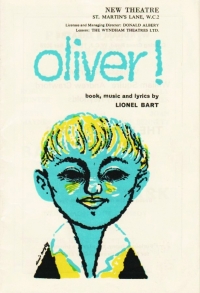
Oliver! is a British musical, with music and lyrics by Lionel Bart. It first appeared in the West End in 1960, enjoying a long run, and was made into a film directed by Carol Reed in 1968.
The musical is loosely based upon the novel Oliver Twist by Charles Dickens. That it was the first musical adaptation of a Charles Dickens work to become a stage hit was one of the reasons why it attracted such attention. There had been two previous Dickens musicals in the 1950s, both of them television adaptations of A Christmas Carol, but the dramatic story of Oliver Twist was the first Dickens work to be presented as a successful stage musical. Another reason for the success of the musical was the revolving stage set, an innovation designed by Sean Kenny.
The show launched the careers of several child actors, including Davy Jones, later of The Monkees; Phil Collins, later of Genesis; and Tony Robinson, who later played the role of Baldrick in the television series Black Adder. The singer Steve Marriott (Small Faces, Humble Pie) also featured in early line-ups, eventually graduating to the role of Artful Dodger in the West End production.
The plot of Dickens's original novel is considerably simplified for the purposes of the musical, with Fagin being represented more as a comic character than as a villain, and large portions of the latter part of the story being completely left out. Although Dickens' novel has been called antisemitic in its portrayal of the Jew Fagin as evil, the production by Bart (himself a Jew) featured many Jewish actors in leading roles: Ron Moody (Ronald Moodnik), Georgia Brown (Lilian Klot), and Martin Horsey.
The musical is loosely based upon the novel Oliver Twist by Charles Dickens. That it was the first musical adaptation of a Charles Dickens work to become a stage hit was one of the reasons why it attracted such attention. There had been two previous Dickens musicals in the 1950s, both of them television adaptations of A Christmas Carol, but the dramatic story of Oliver Twist was the first Dickens work to be presented as a successful stage musical. Another reason for the success of the musical was the revolving stage set, an innovation designed by Sean Kenny.
The show launched the careers of several child actors, including Davy Jones, later of The Monkees; Phil Collins, later of Genesis; and Tony Robinson, who later played the role of Baldrick in the television series Black Adder. The singer Steve Marriott (Small Faces, Humble Pie) also featured in early line-ups, eventually graduating to the role of Artful Dodger in the West End production.
The plot of Dickens's original novel is considerably simplified for the purposes of the musical, with Fagin being represented more as a comic character than as a villain, and large portions of the latter part of the story being completely left out. Although Dickens' novel has been called antisemitic in its portrayal of the Jew Fagin as evil, the production by Bart (himself a Jew) featured many Jewish actors in leading roles: Ron Moody (Ronald Moodnik), Georgia Brown (Lilian Klot), and Martin Horsey.
Vivaldi

Antonio Lucio Vivaldi (March 4, 1678 â July 28, 1741), nicknamed il Prete Rosso ("The Red Priest"), was a Venetian priest and Baroque music composer, as well as a famous virtuoso violinist; he was born and raised in the Republic of Venice. The Four Seasons, a series of four violin concerti, is his best-known work and a highly popular Baroque piece.
Many of Vivaldi's compositions reflect a flamboyant, almost playful, exuberance. Most of Vivaldi's repertoire was rediscovered only in the first half of the 20th century in Turin and Genoa and was published in the second half. Vivaldi's music is innovative, breaking a consolidated tradition in schemes; he gave brightness to the formal and the rhythmic structure of the concerto, repeatedly looking for harmonic contrasts and innovative melodies and themes. Moreover, Vivaldi was able to compose nonacademic music, particularly meant to be appreciated by the wide public and not only by an intellectual minority. The joyful appearance of his music reveals in this regard a transmissible joy of composing; these are among the causes of the vast popularity of his music. This popularity soon made him famous in other countries such as France which was, at the time, very independent concerning its musical taste.
Vivaldi is considered one of the composers who brought Baroque music (with its typical contrast among heavy sonorities) to evolve into a classical style. Johann Sebastian Bach was deeply influenced by Vivaldi's concertos and arias (recalled in his Johannes Passion, Matthäuspassion, and cantatas). Bach transcribed a number of Vivaldi's concerti for solo keyboard, along with a number for orchestra, including the famous Concerto for Four Violins and Violoncello, Strings and Continuo (RV 580).
Many of Vivaldi's compositions reflect a flamboyant, almost playful, exuberance. Most of Vivaldi's repertoire was rediscovered only in the first half of the 20th century in Turin and Genoa and was published in the second half. Vivaldi's music is innovative, breaking a consolidated tradition in schemes; he gave brightness to the formal and the rhythmic structure of the concerto, repeatedly looking for harmonic contrasts and innovative melodies and themes. Moreover, Vivaldi was able to compose nonacademic music, particularly meant to be appreciated by the wide public and not only by an intellectual minority. The joyful appearance of his music reveals in this regard a transmissible joy of composing; these are among the causes of the vast popularity of his music. This popularity soon made him famous in other countries such as France which was, at the time, very independent concerning its musical taste.
Vivaldi is considered one of the composers who brought Baroque music (with its typical contrast among heavy sonorities) to evolve into a classical style. Johann Sebastian Bach was deeply influenced by Vivaldi's concertos and arias (recalled in his Johannes Passion, Matthäuspassion, and cantatas). Bach transcribed a number of Vivaldi's concerti for solo keyboard, along with a number for orchestra, including the famous Concerto for Four Violins and Violoncello, Strings and Continuo (RV 580).
Alan Menken

Alan Menken (born July 22, 1949 in New Rochelle, New York) is an American Broadway and an eight-time Academy Award winning composer and pianist. Menken has collaborated with several renowned lyricists including Howard Ashman (1950-1991), Tim Rice and Stephen Schwartz.
Chopin

Frédéric Chopin (1 March 1810 – 17 October 1849) was a Polish composer and virtuoso pianist of the Romantic period. He is widely regarded as the greatest Polish composer, and ranks as one of music's greatest tone poets.
He was born in the village of Żelazowa Wola, in the Duchy of Warsaw, to a Polish mother and French-expatriate father, and in his early life was regarded as a child-prodigy pianist. In November 1830, at the age of 20, Chopin went abroad; following the suppression of the Polish November Uprising of 1830–31, he became one of many expatriates of the Polish "Great Emigration."
In Paris, he made a comfortable living as a composer and piano teacher, while giving few public performances. A Polish patriot,
Chopin's extant compositions were written primarily for the piano as a solo instrument. Though technically demanding, Chopin's style emphasizes nuance and expressive depth rather than virtuosity. Chopin invented musical forms such as the ballade and was responsible for major innovations in forms such as the piano sonata, waltz, nocturne, étude, impromptu and prelude. His works are mainstays of Romanticism in 19th-century classical music.
He was born in the village of Żelazowa Wola, in the Duchy of Warsaw, to a Polish mother and French-expatriate father, and in his early life was regarded as a child-prodigy pianist. In November 1830, at the age of 20, Chopin went abroad; following the suppression of the Polish November Uprising of 1830–31, he became one of many expatriates of the Polish "Great Emigration."
In Paris, he made a comfortable living as a composer and piano teacher, while giving few public performances. A Polish patriot,
Chopin's extant compositions were written primarily for the piano as a solo instrument. Though technically demanding, Chopin's style emphasizes nuance and expressive depth rather than virtuosity. Chopin invented musical forms such as the ballade and was responsible for major innovations in forms such as the piano sonata, waltz, nocturne, étude, impromptu and prelude. His works are mainstays of Romanticism in 19th-century classical music.
Astor Piazzolla

Ástor Pantaleón Piazzolla (March 11, 1921 – July 4, 1992) was an Argentine tango composer and bandoneón player. His oeuvre revolutionized the traditional tango into a new style termed nuevo tango, incorporating elements from jazz and classical music. An excellent bandoneonist, he regularly performed his own compositions with different ensembles.
Piazzolla's nuevo tango was distinct from the traditional tango in its incorporation of elements of jazz, its use of extended harmonies and dissonance, its use of counterpoint, and its ventures into extended compositional forms. As Argentine psychoanalyst Carlos Kuri has pointed out, Piazzolla's fusion of tango with this wide range of other recognizable Western musical elements was so successful that it produced a new individual style transcending these influences. It is precisely this success, and individuality, that makes it hard to pin down where particular influences reside in his compositions, but some aspects are clear. The use of the passacaglia technique of a circulating bass line and harmonic sequence, invented and much used in 17th and 18th century baroque music but also central to the idea of jazz "changes", predominates in most of Piazzolla's mature compositions. Another clear reference to the baroque is the often complex and virtuosic counterpoint that sometimes follows strict fugal behavior but more often simply allows each performer in the group to assert his voice. A further technique that emphasises this sense of democracy and freedom among the musicians is improvisation that is borrowed from jazz in concept, but in practice involves a different vocabulary of scales and rhythms that stay within the parameters of the established tango sound-world. Pablo Ziegler has been particularly responsible for developing this aspect of the style both within Piazzolla's groups and since the composer's death.
Piazzolla's nuevo tango was distinct from the traditional tango in its incorporation of elements of jazz, its use of extended harmonies and dissonance, its use of counterpoint, and its ventures into extended compositional forms. As Argentine psychoanalyst Carlos Kuri has pointed out, Piazzolla's fusion of tango with this wide range of other recognizable Western musical elements was so successful that it produced a new individual style transcending these influences. It is precisely this success, and individuality, that makes it hard to pin down where particular influences reside in his compositions, but some aspects are clear. The use of the passacaglia technique of a circulating bass line and harmonic sequence, invented and much used in 17th and 18th century baroque music but also central to the idea of jazz "changes", predominates in most of Piazzolla's mature compositions. Another clear reference to the baroque is the often complex and virtuosic counterpoint that sometimes follows strict fugal behavior but more often simply allows each performer in the group to assert his voice. A further technique that emphasises this sense of democracy and freedom among the musicians is improvisation that is borrowed from jazz in concept, but in practice involves a different vocabulary of scales and rhythms that stay within the parameters of the established tango sound-world. Pablo Ziegler has been particularly responsible for developing this aspect of the style both within Piazzolla's groups and since the composer's death.
Bob Marley
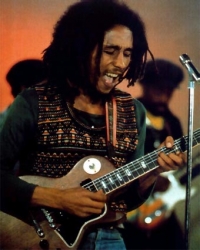
Robert "Bob" Nesta Marley OM (February 6, 1945 – May 11, 1981) was a Jamaican musician, singer-songwriter and Rastafarian. He was the lead singer, songwriter and guitarist for the ska, rocksteady and reggae bands: The Wailers (1964 – 1974) and Bob Marley & the Wailers (1974 – 1981). Marley died nearly thirty years ago, but remains the most widely known and revered performer of reggae music, and is credited for helping spread Jamaican music to the worldwide audience.
Marley's best known hits include "I Shot the Sheriff", "No Woman, No Cry", "Exodus", "Could You Be Loved", "Stir It Up", "Jamming", "Redemption Song", "One Love" and, together with The Wailers, ""Three Little Birds",
Marley's best known hits include "I Shot the Sheriff", "No Woman, No Cry", "Exodus", "Could You Be Loved", "Stir It Up", "Jamming", "Redemption Song", "One Love" and, together with The Wailers, ""Three Little Birds",
Epica
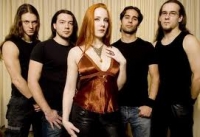
Epica is a Dutch symphonic metal band founded by guitarist and vocalist Mark Jansen subsequent to his departure from After Forever. They are known for their symphonic sound and the use of female vocals and male growls performed by Simone Simons and Mark Jansen, respectively. All six members write the music, but Mark Jansen and Simone Simons write most of the lyrics, which largely deal with philosophical topics, including science and religion, and world events. To date, Epica has released five studio albums (not including their instrumental album The Score – An Epic Journey ), with their most recent studio album, Requiem for the Indifferent, released on March 9, 2012.
Jan Václav Voříšek
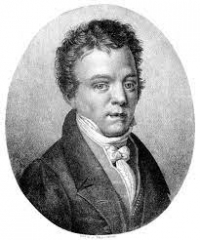
Jan Václav Hugo Voříšek (Czech pronunciation: ; Johann Hugo Worzischek, 11 May 1791, in Vamberk, Bohemia – 19 November 1825, in Vienna, Austria) was a Czech composer, pianist and organistVoříšek was born in the town of Vamberk, Bohemia, where his father was schoolmaster, choirmaster and organist. As a child prodigy, he started to perform publicly in Bohemian towns at the age of nine. His father taught him music, encouraged his playing the piano and helped him get a scholarship to attend the University of Prague, where he studied philosophy.
Ragnarok Online

Ragnarok Online (Korean: 라그나로크 온라인, alternatively subtitled The Final Destiny of the Gods), often referred to as RO, is a massively multiplayer online role-playing game or MMORPG created by GRAVITY Co., Ltd. based on the manhwa Ragnarok by Lee Myung-jin. It was first released in South Korea on 31 August 2002 for Microsoft Windows and has since been released in many other locales around the world. Its style and settings have been influenced by a wide variety of international cultures. The game has spawned an animated series, Ragnarok the Animation, and a sequel game, Ragnarok Online 2: Legend of The Second, is in development. Player characters exist in a world with a player environment that gradually changes with the passage of time. Major changes in the features and history of the world take place as episodes in the RO timeline. Player characters interact in a 3D environment but are represented by 2D character sprites for front, back, side and diagonal facings.
Bach

Johann Sebastian Bach (31 March 1685 – 28 July 1750) was a German composer and organist whose sacred and secular works for choir, orchestra, and solo instruments drew together the strands of the Baroque period and brought it to its ultimate maturity. Although he introduced no new forms, he enriched the prevailing German style with a robust contrapuntal technique, an unrivalled control of harmonic and motivic organisation in composition for diverse musical forces, and the adaptation of rhythms and textures from abroad, particularly Italy and France.
Revered for their intellectual depth and technical and artistic beauty, Bach's works include the Brandenburg concertos; the Goldberg Variations; the English Suites, French Suites, Partitas, and Well-Tempered Clavier; the Mass in B Minor; the St. Matthew Passion; the St. John Passion; The Musical Offering; The Art of Fugue; the Sonatas and Partitas for violin solo; the Cello Suites; more than 200 surviving cantatas; and a similar number of organ works, including the celebrated Toccata and Fugue in D Minor.
While Bach's fame as an organist was great during his lifetime, he was not particularly well-known as a composer. His adherence to Baroque forms and contrapuntal style was considered "old-fashioned" by his contemporaries, especially late in his career when the musical fashion tended towards Rococo and later Classical styles. A revival of interest and performances of his music began early in the 19th century, and he is now widely considered to be one of the greatest composers in the Western tradition.
Revered for their intellectual depth and technical and artistic beauty, Bach's works include the Brandenburg concertos; the Goldberg Variations; the English Suites, French Suites, Partitas, and Well-Tempered Clavier; the Mass in B Minor; the St. Matthew Passion; the St. John Passion; The Musical Offering; The Art of Fugue; the Sonatas and Partitas for violin solo; the Cello Suites; more than 200 surviving cantatas; and a similar number of organ works, including the celebrated Toccata and Fugue in D Minor.
While Bach's fame as an organist was great during his lifetime, he was not particularly well-known as a composer. His adherence to Baroque forms and contrapuntal style was considered "old-fashioned" by his contemporaries, especially late in his career when the musical fashion tended towards Rococo and later Classical styles. A revival of interest and performances of his music began early in the 19th century, and he is now widely considered to be one of the greatest composers in the Western tradition.
Mozart

Wolfgang Amadeus Mozart, full name Johann Chrysostom Wolfgang Amadeus Mozart (27 January 1756 â 5 December 1791) was a prolific and influential composer of the Classical era. His over 600 compositions include works widely acknowledged as pinnacles of symphonic, concertante, chamber, piano, operatic, and choral music. Mozart is among the most enduringly popular of classical composers, and many of his works are part of the standard concert repertoire.
Mozart's music, like Haydn's, stands as an archetypal example of the Classical style. His works spanned the period during which that style transformed from one exemplified by the style galant to one that began to incorporate some of the contrapuntal complexities of the late Baroque, complexities against which the galant style had been a reaction. Mozart's own stylistic development closely paralleled the development of the classical style as a whole. In addition, he was a versatile composer and wrote in almost every major genre, including symphony, opera, the solo concerto, chamber music including string quartet and string quintet, and the piano sonata. While none of these genres were new, the piano concerto was almost single-handedly developed and popularized by Mozart. He also wrote a great deal of religious music, including masses; and he composed many dances, divertimenti, serenades, and other forms of light entertainment.
The central traits of the classical style can be identified in Mozart's music. Clarity, balance, and transparency are hallmarks of his work.
Mozart's music, like Haydn's, stands as an archetypal example of the Classical style. His works spanned the period during which that style transformed from one exemplified by the style galant to one that began to incorporate some of the contrapuntal complexities of the late Baroque, complexities against which the galant style had been a reaction. Mozart's own stylistic development closely paralleled the development of the classical style as a whole. In addition, he was a versatile composer and wrote in almost every major genre, including symphony, opera, the solo concerto, chamber music including string quartet and string quintet, and the piano sonata. While none of these genres were new, the piano concerto was almost single-handedly developed and popularized by Mozart. He also wrote a great deal of religious music, including masses; and he composed many dances, divertimenti, serenades, and other forms of light entertainment.
The central traits of the classical style can be identified in Mozart's music. Clarity, balance, and transparency are hallmarks of his work.
Enrique Iglesias
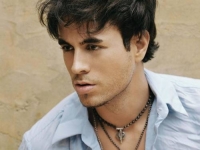
Enrique Miguel Iglesias Preysler (born May 8, 1975) is a Spanish-Filipino pop singer-songwriter. His career started in Mexico on Indie label Fonovisa who helped turn him into one of the most popular artists in Latin America and in the Latin market in the United States, selling more Spanish albums than any other artists in that period of time. Before the turn of the millennium he made a crossover into the mainstream English market and signed a unique multi-album deal with Universal Music for an unprecedented $48,000,000, with Universal Music Latino to release his Spanish albums and Interscope to release English albums, Enrique Iglesias has so far sold over 50.000.000 albums worldwide. Iglesias has had two Billboard Hot 100 #1s and one #3, and he holds the record for producing eighteen number #1 Spanish-language singles on the Billboard's Hot Latin Tracks.
Cole Porter

Cole Albert Porter (June 9, 1891 – October 15, 1964) was an American composer and songwriter. His works include the musical comedies Kiss Me, Kate, Fifty Million Frenchmen, DuBarry Was a Lady and Anything Goes, as well as songs like "Night and Day", "I Get a Kick out of You", "Well, Did You Evah!" and "I've Got You Under My Skin". He was noted for his sophisticated, bawdy lyrics, clever rhymes and complex forms. Porter was one of the greatest contributors to the Great American Songbook. Cole Porter is one of the few Tin Pan Alley composers to have written both the lyrics and the music for his songs.
Handel

George Frideric Handel (Friday, 23 February 1685 - Saturday, 14 April 1759) was a German-born Baroque composer who is famous for his operas, oratorios and concerti grossi. Born as Georg Friedrich Handel in Halle, he spent most of his adult life in England, becoming a subject of the British crown on 22 January 1727. His most famous works are Messiah, an oratorio set to texts from the King James Bible; Water Music; and Music for the Royal Fireworks. Strongly influenced by the techniques of the great composers of the Italian Baroque and the English composer Henry Purcell, his music was known to many significant composers who came after him, including Haydn, Mozart, and Beethoven.
Handel's compositions include 42 operas; 29 oratorios; more than 120 cantatas, trios and duets; numerous arias; chamber music; a large number of ecumenical pieces; odes and serenatas; and sixteen organ concerti. His most famous work, the Messiah oratorio with its "Hallelujah" chorus, is among the most popular works in choral music and has become a centerpiece of the Christmas season. Also popular are the Opus 3 and 6 Concerti Grossi, as well as "The Cuckoo and the Nightingale", in which birds are heard calling during passages played in different keys representing the vocal ranges of two birds. Also notable are his sixteen keyboard suites, especially The Harmonious Blacksmith.
Handel introduced various previously uncommon musical instruments in his works: the viola d'amore and violetta marina (Orlando), the lute (Ode for St. Cecilia's Day), three trombones (Saul), clarinets or small high cornets (Tamerlano), theorbo, French horn (Water Music), lyrichord, double bassoon, viola da gamba, bell chimes, positive organ, and harp (Giulio Cesare, Alexander's Feast).
Handel's compositions include 42 operas; 29 oratorios; more than 120 cantatas, trios and duets; numerous arias; chamber music; a large number of ecumenical pieces; odes and serenatas; and sixteen organ concerti. His most famous work, the Messiah oratorio with its "Hallelujah" chorus, is among the most popular works in choral music and has become a centerpiece of the Christmas season. Also popular are the Opus 3 and 6 Concerti Grossi, as well as "The Cuckoo and the Nightingale", in which birds are heard calling during passages played in different keys representing the vocal ranges of two birds. Also notable are his sixteen keyboard suites, especially The Harmonious Blacksmith.
Handel introduced various previously uncommon musical instruments in his works: the viola d'amore and violetta marina (Orlando), the lute (Ode for St. Cecilia's Day), three trombones (Saul), clarinets or small high cornets (Tamerlano), theorbo, French horn (Water Music), lyrichord, double bassoon, viola da gamba, bell chimes, positive organ, and harp (Giulio Cesare, Alexander's Feast).
James Horner
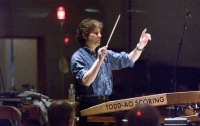
James Roy Horner (born August 14, 1953) is an award winning American composer, orchestrator and conductor of orchestral and film music. He is noted for the integration of choral and electronic elements in many of his film scores, and for frequent use of Celtic musical elements.
In a career that spans over three decades, Horner has composed several of Hollywood's most famous film scores. He is probably best known for his critically acclaimed works on the 1997 film Titanic, which remains today the best selling film soundtrack of all time. Other popular works include Braveheart, Apollo 13, The Mask of Zorro, and The Legend of Zorro.
Horner is a two time Academy Award winner, and has received a total of 11 nominations. He has won numerous other awards, including the Golden Globe Award and the Grammy Award.
In a career that spans over three decades, Horner has composed several of Hollywood's most famous film scores. He is probably best known for his critically acclaimed works on the 1997 film Titanic, which remains today the best selling film soundtrack of all time. Other popular works include Braveheart, Apollo 13, The Mask of Zorro, and The Legend of Zorro.
Horner is a two time Academy Award winner, and has received a total of 11 nominations. He has won numerous other awards, including the Golden Globe Award and the Grammy Award.
Leonard Cohen
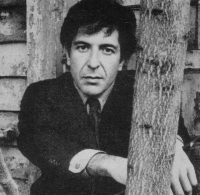
Leonard Norman Cohen, CC, GOQ (born September 21, 1934) is a Canadian singer-songwriter, musician, poet and novelist. Cohen published his first book of poetry in Montreal in 1956 and his first novel in 1963. His work often deals with the exploration of religion, isolation, sexuality and complex interpersonal relationships. Famously reclusive, spending years in a Zen Buddhist monastery, and possessing a persona frequently associated with mystique, he is extremely well-regarded by critics for his literary accomplishments and for producing an output of work of high artistic quality over a five-decade career.
Musically, Cohen's earliest songs (many of which appeared on the 1967 album, Songs of Leonard Cohen) were rooted in European folk music. In the 1970s, his material encompassed pop, cabaret and world music. Since the 1980s his high baritone voice has evolved into lower registers (bass baritone and bass), with accompaniment from a wide variety of instruments and female backing singers.
Over 2,000 renditions of Cohen's songs have been recorded. Cohen has been inducted into both the Canadian Music Hall of Fame and the Canadian Songwriters Hall of Fame and is also a Companion of the Order of Canada, the nation's highest civilian honour. While giving the speech at Cohen's induction into the American Rock and Roll Hall of Fame on March 10, 2008, Lou Reed described Cohen as belonging to the "highest and most influential echelon of songwriters".
Musically, Cohen's earliest songs (many of which appeared on the 1967 album, Songs of Leonard Cohen) were rooted in European folk music. In the 1970s, his material encompassed pop, cabaret and world music. Since the 1980s his high baritone voice has evolved into lower registers (bass baritone and bass), with accompaniment from a wide variety of instruments and female backing singers.
Over 2,000 renditions of Cohen's songs have been recorded. Cohen has been inducted into both the Canadian Music Hall of Fame and the Canadian Songwriters Hall of Fame and is also a Companion of the Order of Canada, the nation's highest civilian honour. While giving the speech at Cohen's induction into the American Rock and Roll Hall of Fame on March 10, 2008, Lou Reed described Cohen as belonging to the "highest and most influential echelon of songwriters".
Buck Owens
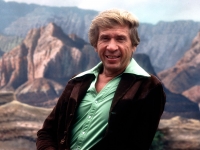
Alvis Edgar Owens Jr., known professionally as Buck Owens, was an American musician, singer, songwriter and band leader. He was the front man for Buck Owens and the Buckaroos, which had 21 No. 1 hits on the Billboard country music chart.
Alice Cooper

Alice Cooper (born Vincent Damon Furnier; February 4, 1948) is an American rock singer, songwriter and musician whose career spans more than four decades. With a stage show that features guillotines, electric chairs, fake blood, boa constrictors and baby dolls, Cooper has drawn equally from horror movies, vaudeville, and garage rock to pioneer a grandly theatrical and violent brand of heavy metal that was designed to shock.
Alice Cooper was originally a band consisting of Furnier on vocals and harmonica, lead guitarist Glen Buxton, Michael Bruce on rhythm guitar, Dennis Dunaway on bass guitar, and drummer Neal Smith. The original Alice Cooper band broke into the international music mainstream with 1971's monster hit "I'm Eighteen" from the album Love it to Death, which was followed by the even bigger single "School's Out" in 1972. The band reached their commercial peak with the 1973 album Billion Dollar Babies.
Furnier's solo career as Alice Cooper, adopting the band's name as his own name, began with the 1975 concept album Welcome to My Nightmare. In 2008 he released Along Came a Spider, his 18th solo album. Expanding from his original Detroit rock roots, over the years Cooper has experimented with many different musical styles, including conceptual rock, art rock, hard rock, new wave, pop rock, experimental rock and industrial rock. In recent times he has returned more to his garage rock roots.
Alice Cooper is known for his social and witty persona offstage, The Rolling Stone Album Guide going so far as to refer to him as the world's most "beloved heavy metal entertainer". He helped to shape the sound and look of heavy metal, and is seen as being the person who "first introduced horror imagery to rock'n'roll, and whose stagecraft and showmanship have permanently transformed the genre". Away from music, Cooper is a film actor, a golfing celebrity, a restaurateur and, since 2004, a popular radio DJ with his classic rock show Nights with Alice Cooper.
On VH1's "100 Greatest artists of Hard Rock", Cooper was ranked #20.
Alice Cooper was originally a band consisting of Furnier on vocals and harmonica, lead guitarist Glen Buxton, Michael Bruce on rhythm guitar, Dennis Dunaway on bass guitar, and drummer Neal Smith. The original Alice Cooper band broke into the international music mainstream with 1971's monster hit "I'm Eighteen" from the album Love it to Death, which was followed by the even bigger single "School's Out" in 1972. The band reached their commercial peak with the 1973 album Billion Dollar Babies.
Furnier's solo career as Alice Cooper, adopting the band's name as his own name, began with the 1975 concept album Welcome to My Nightmare. In 2008 he released Along Came a Spider, his 18th solo album. Expanding from his original Detroit rock roots, over the years Cooper has experimented with many different musical styles, including conceptual rock, art rock, hard rock, new wave, pop rock, experimental rock and industrial rock. In recent times he has returned more to his garage rock roots.
Alice Cooper is known for his social and witty persona offstage, The Rolling Stone Album Guide going so far as to refer to him as the world's most "beloved heavy metal entertainer". He helped to shape the sound and look of heavy metal, and is seen as being the person who "first introduced horror imagery to rock'n'roll, and whose stagecraft and showmanship have permanently transformed the genre". Away from music, Cooper is a film actor, a golfing celebrity, a restaurateur and, since 2004, a popular radio DJ with his classic rock show Nights with Alice Cooper.
On VH1's "100 Greatest artists of Hard Rock", Cooper was ranked #20.
Ludovico Einaudi

Ludovico Einaudi (born 23 November 1955) is an Italian contemporary classical music composer and pianist.
Although Einaudi would prefer not to be labeled as any particular type of genre, he is sometimes referred to as Minimalist. This is despite his music not sharing the key musical properties associated with minimalism. This may be due to his music possessing sparse orchestration and simplistic melodies that some may wish to refer to as 'minimalist' despite not belonging to the musical movement of Minimalism.
Einaudi's own words on the matter reflect this viewpoint, with Einaudi referring to Minimalism as "elegance and openness", despite its more formal definition as a musical movement to which he arguably does not belong.
Although Einaudi would prefer not to be labeled as any particular type of genre, he is sometimes referred to as Minimalist. This is despite his music not sharing the key musical properties associated with minimalism. This may be due to his music possessing sparse orchestration and simplistic melodies that some may wish to refer to as 'minimalist' despite not belonging to the musical movement of Minimalism.
Einaudi's own words on the matter reflect this viewpoint, with Einaudi referring to Minimalism as "elegance and openness", despite its more formal definition as a musical movement to which he arguably does not belong.
Within Temptation
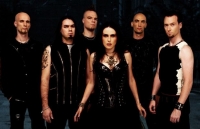
Within Temptation is a Dutch rock/metal band. The band was founded in 1996 by vocalist Sharon den Adel and guitarist Robert Westerholt. Their music is described as symphonic metal, gothic metal, although in an interview, Den Adel said they fell into a symphonic rock genre with various influences, and in a later interview with 3VOOR12, Sharon stated that "we consider ourselves more a symphonic rock band ... we are in my opinion no gothic band".
After the release of their first album Enter, the band became prominent in the underground scene. However it was not until 2001 that they became known to the general public, with the single "Ice Queen" from the album Mother Earth, which reached #2 on the charts. Since then, the band won the Conamus Exportprijs five years in a row. Their next album The Silent Force debuted at #1 on the Dutch charts, as did their latest, The Heart of Everything. In 2008 they released a live DVD and CD, Black Symphony, recorded with the Metropole Orchestra.
On August 11, 2009 Within Temptation announced that they would be releasing a live album consisting of acoustic sets from their theatre tour, entitled An Acoustic Night At The Theatre, which was released on October 30th.
After the release of their first album Enter, the band became prominent in the underground scene. However it was not until 2001 that they became known to the general public, with the single "Ice Queen" from the album Mother Earth, which reached #2 on the charts. Since then, the band won the Conamus Exportprijs five years in a row. Their next album The Silent Force debuted at #1 on the Dutch charts, as did their latest, The Heart of Everything. In 2008 they released a live DVD and CD, Black Symphony, recorded with the Metropole Orchestra.
On August 11, 2009 Within Temptation announced that they would be releasing a live album consisting of acoustic sets from their theatre tour, entitled An Acoustic Night At The Theatre, which was released on October 30th.
Adolf von Henselt
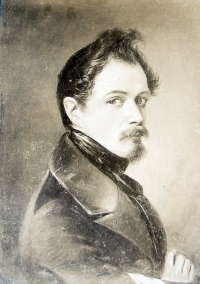
Georg Martin Adolf von Henselt (9 or 12 May 1814 – 10 October 1889) was a German composer and virtuoso pianist.Henselt was born at Schwabach, in Bavaria. At the age of three he began to learn the violin, and at five the piano under Josephe von Flad (1778-1843), who had trained in composition with Franz Danzi, Abbé (George Joseph) Vogler, Joseph Graetz and studied piano with Franz Lauska (who later coached Meyerbeer, Felix and Fanny Mendelssohn). His concert debut was at the Odeon in Munich, where he played the opening Allegro to one of Mozart's C major concertos, a free fantasy with variations on a theme from Weber's Der Freischütz, and a rondo by Kalkbrenner
Braveheart
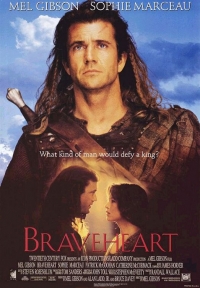
Braveheart is a 1995 historical action-drama movie produced and directed by Mel Gibson, who also starred in the title role. The film was written for screen and then novelized by Randall Wallace. Gibson portrays a legendary Scot, William Wallace, who gained recognition when he came to the forefront of the First War of Scottish Independence by opposing Edward I of England (portrayed by Patrick McGoohan) and subsequently abetted by Edward's daughter-in-law Princess Isabelle (played by Sophie Marceau) and a claimant to the Scottish throne, Robert the Bruce (played by Angus Macfadyen).
The film won five Academy Awards at the 68th Academy Awards, including the Academy Award for Best Picture and Best Director, and had been nominated for an additional five. Produced by Icon Productions for Paramount Pictures and 20th Century Fox, the film's success helped revive the historical epic genre, with subsequent films such as Gladiator, Troy, Kingdom of Heaven, 300, and Mongol.
The film won five Academy Awards at the 68th Academy Awards, including the Academy Award for Best Picture and Best Director, and had been nominated for an additional five. Produced by Icon Productions for Paramount Pictures and 20th Century Fox, the film's success helped revive the historical epic genre, with subsequent films such as Gladiator, Troy, Kingdom of Heaven, 300, and Mongol.
Huyen Linh
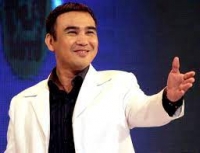
Huyền Linh Musical artist Born: Haiphong, Vietnam.
Echevarría, Victorino
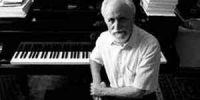
Most widely held works about Victorino Echevarría. Twentieth century Spanish composers for the harp : a study of Spanish folk elements in selected solo harp ...
Guy Bergeron
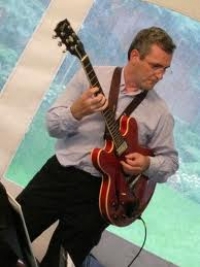
Guy Bergeron was born the 13th of October 1964 in Loretteville, Province of Quebec, Canada. He graduated in music: in 1990, 3rd cycle in composition at the Conservatoire de musique of Quebec; in 1986, collegial grade (DEC) in pop music, Cegep of Drummondville, and in 1984, collegial grade (DEC) in music, Cegep of Ste-Foy, with guitar as first instrument. He was also a student in jazz interpretation from 1992 until 1994 at the University of Montreal (electric guitar) and he studied computer-assisted music at the Musitechnic School in Montreal. He plays the guitar (classical, electric, acoustic, synthesizer), the banjo, the mandolin and the bass. He's been earning his living with music for more than 25 years, as a professional musician, a composer, an arranger and also as a studio engineer as he manages his own studio.
Johann Sebastian Bach

Johann Sebastian Bach (31 March 1685 – 28 July 1750) was a German composer and musician of the Baroque period. He is known for instrumental compositions such as the Art of Fugue, the Brandenburg Concertos, and the Goldberg Variations, and for vocal music such as the St Matthew Passion and the Mass in B minor. Since the 19th-century Bach Revival he has been generally regarded as one of the greatest composers of the Western art musical canon.
The Addams Family
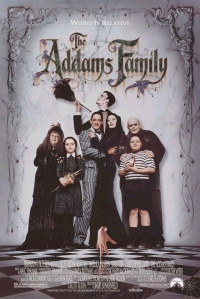
The Addams Family is a 1991 black comedy film based on the characters, from the cartoon of the same name, created by cartoonist Charles Addams, featuring songs and a video from rap artist MC Hammer ("Addams Groove").
The movie was originally developed by Orion Pictures (which at the time owned the rights to the television series on which the movie was based). However, due to the studio's financial problems, Paramount Pictures began co-producing the film and ended up releasing the movie in the U.S., with Orion retaining the international rights (these rights are now owned by Metro-Goldwyn-Mayer through their 1997 purchase of Orion). The 1993 sequel, Addams Family Values, was distributed worldwide by Paramount.
The Addamses are a family of wealthy and eccentric individuals who live together in a Second Empire mansion and share a common interest in the bizarre and the macabre. The characters first appeared in cartoons in The New Yorker magazine in the 1930s, and later gained popularity in the defunct TV series, The Addams Family. The film centers on the day to day life of the family, and the return of Gomez Addams's long-lost brother Fester, played by Christopher Lloyd. The film also stars Raúl Juliá, Anjelica Huston, and Christina Ricci.
The movie was originally developed by Orion Pictures (which at the time owned the rights to the television series on which the movie was based). However, due to the studio's financial problems, Paramount Pictures began co-producing the film and ended up releasing the movie in the U.S., with Orion retaining the international rights (these rights are now owned by Metro-Goldwyn-Mayer through their 1997 purchase of Orion). The 1993 sequel, Addams Family Values, was distributed worldwide by Paramount.
The Addamses are a family of wealthy and eccentric individuals who live together in a Second Empire mansion and share a common interest in the bizarre and the macabre. The characters first appeared in cartoons in The New Yorker magazine in the 1930s, and later gained popularity in the defunct TV series, The Addams Family. The film centers on the day to day life of the family, and the return of Gomez Addams's long-lost brother Fester, played by Christopher Lloyd. The film also stars Raúl Juliá, Anjelica Huston, and Christina Ricci.
Justin Timberlake
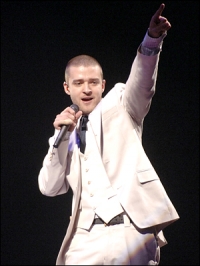
Justin Randall Timberlake (born January 31, 1981) is an American pop singer-songwriter, record producer, dancer and actor. He has won six Grammy Awards as well as an Emmy Award.
Justin Timberlake came to fame as one of the lead singers of pop "boy band" (or "vocal harmony group") 'N Sync, whose launch was financed by Lou Pearlman. In 2002, he released his debut solo album, Justified, which sold more than 7 million copies worldwide. Timberlake's second solo release, FutureSex/LoveSounds, was released in 2006 with the U.S. number-one hit singles "SexyBack", "My Love", and "What Goes Around.../...Comes Around". The album also spawned three additional U.S. top twenty hits ("Summer Love", "LoveStoned", and "Until the End of Time"). As of January 2008, FutureSex/LoveSounds has sold more than 8.6 million copies. With his first two albums, Timberlake has sold more than 18 million records worldwide alone, as well as more than 50 million copies as one of the two lead singers in 'N Sync. His other ventures include record label Tennman Records, fashion label William Rast, and the restaurants Destino and Southern Hospitality.
Justin Timberlake came to fame as one of the lead singers of pop "boy band" (or "vocal harmony group") 'N Sync, whose launch was financed by Lou Pearlman. In 2002, he released his debut solo album, Justified, which sold more than 7 million copies worldwide. Timberlake's second solo release, FutureSex/LoveSounds, was released in 2006 with the U.S. number-one hit singles "SexyBack", "My Love", and "What Goes Around.../...Comes Around". The album also spawned three additional U.S. top twenty hits ("Summer Love", "LoveStoned", and "Until the End of Time"). As of January 2008, FutureSex/LoveSounds has sold more than 8.6 million copies. With his first two albums, Timberlake has sold more than 18 million records worldwide alone, as well as more than 50 million copies as one of the two lead singers in 'N Sync. His other ventures include record label Tennman Records, fashion label William Rast, and the restaurants Destino and Southern Hospitality.
A.Kastalsky
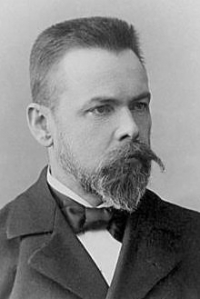
Alexandr Dmitriyevich Kastalsky was a Russian composer and folklorist. Kastalsky was born in Moscow to protoiereus Dmitri Ivanovich Kastalsky. He studied music theory, composition and the piano at the Moscow Conservatory.
Alana Lagrange
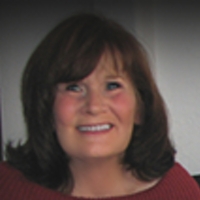
Alana LaGrange is known for her Live, Training Piano Seminars & online piano lessons for the Novice to the expert Jazz pianist.
Phil Rose
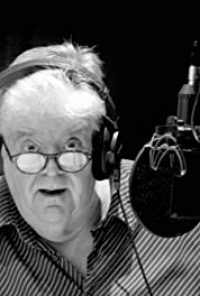
Phil Rose (born 2 May 1952) is an English actor and musicians best known for his role as Friar Tuck in the 1980s TV series Robin of Sherwood.Rose was born in Manchester, and established himself as a theatre actor playing Sir Toby Belch in Twelfth Night and The Gangster in Kiss Me, Kate at Bristol Old Vic. Numerous touring appearances followed, including the Ludlow Festival, Dundee Repertory Theatre and Colwyn Bay.
Alfred Newman
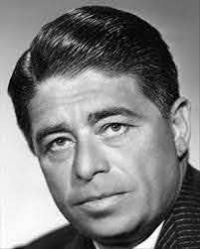
Alfred Newman was an American composer, arranger, and conductor of film music. From his start as a music prodigy, he came to be regarded as a respected figure in the history of film music.
David Wise

David Wise (born 1967) is an English video game music composer and musician. He was a composer at Rare from 1985 to 2009, and was the company's sole musician up until 1994. He has gained a cult following for his work on various games, particularly Nintendo's Donkey Kong Country series. Wise is known for his atmospheric style of music, mixing natural environmental sounds with prominent melodic and percussive accompaniment.
The Platters
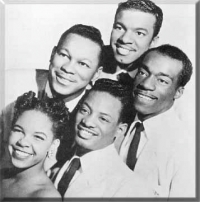
The Platters were a successful vocal group of the early rock and roll era. Their distinctive sound was a bridge between the pre-rock Tin Pan Alley tradition, and the burgeoning new genre. The original group members were Alex Hodge, Cornell Gunther, David Lynch, Joe Jefferson, Gaynel Hodge and Herb Reed.
After signing with Buck Ram, the act went through several personnel changes before hitting the charts, with the most successful incarnation comprising lead tenor Tony Williams, David Lynch, Paul Robi, Herb Reed, and Zola Taylor.
After signing with Buck Ram, the act went through several personnel changes before hitting the charts, with the most successful incarnation comprising lead tenor Tony Williams, David Lynch, Paul Robi, Herb Reed, and Zola Taylor.
Brahms

Johannes Brahms (May 7, 1833 â April 3, 1897) was a German composer of the Romantic period. He was born in Hamburg and in his later years he settled in Vienna, Austria.
Brahms maintained a Classical sense of form and order in his works â in contrast to the opulence of the music of many of his contemporaries. Thus many admirers (though not necessarily Brahms himself) saw him as the champion of traditional forms and "pure music," as opposed to the New German embrace of program music.
Brahms venerated Beethoven: in the composer's home, a marble bust of Beethoven looked down on the spot where he composed, and some passages in his works are reminiscent of Beethoven's style. The main theme of the finale of Brahms's First Symphony is reminiscent of the main theme of the finale of Beethoven's Ninth, and when this resemblance was pointed out to Brahms he replied that any ass â jeder Esel â could see that.
Ein deutsches Requiem was partially inspired by his mother's death in 1865, but also incorporates material from a Symphony he started in 1854, but abandoned following Schumann's suicide attempt. He once wrote that the Requiem "belonged to Schumann". The first movement of this abandoned Symphony was re-worked as the first movement of the First Piano Concerto.
Brahms also loved the Classical composers Mozart and Haydn. He collected first editions and autographs of their works, and edited performing editions. He also studied the music of pre-classical composers, including Giovanni Gabrieli, Johann Adolph Hasse, Heinrich Schütz and especially Johann Sebastian Bach. His friends included leading musicologists, and with Friedrich Chrysander he edited an edition of the works of François Couperin. He looked to older music for inspiration in the arts of strict counterpoint; the themes of some of his works are modelled on Baroque sources, such as Bach's The Art of Fugue in the fugal finale of Cello Sonata No. 1, or the same composer's Cantata No. 150 in the passacaglia theme of the Fourth Symphony's finale.
Brahms maintained a Classical sense of form and order in his works â in contrast to the opulence of the music of many of his contemporaries. Thus many admirers (though not necessarily Brahms himself) saw him as the champion of traditional forms and "pure music," as opposed to the New German embrace of program music.
Brahms venerated Beethoven: in the composer's home, a marble bust of Beethoven looked down on the spot where he composed, and some passages in his works are reminiscent of Beethoven's style. The main theme of the finale of Brahms's First Symphony is reminiscent of the main theme of the finale of Beethoven's Ninth, and when this resemblance was pointed out to Brahms he replied that any ass â jeder Esel â could see that.
Ein deutsches Requiem was partially inspired by his mother's death in 1865, but also incorporates material from a Symphony he started in 1854, but abandoned following Schumann's suicide attempt. He once wrote that the Requiem "belonged to Schumann". The first movement of this abandoned Symphony was re-worked as the first movement of the First Piano Concerto.
Brahms also loved the Classical composers Mozart and Haydn. He collected first editions and autographs of their works, and edited performing editions. He also studied the music of pre-classical composers, including Giovanni Gabrieli, Johann Adolph Hasse, Heinrich Schütz and especially Johann Sebastian Bach. His friends included leading musicologists, and with Friedrich Chrysander he edited an edition of the works of François Couperin. He looked to older music for inspiration in the arts of strict counterpoint; the themes of some of his works are modelled on Baroque sources, such as Bach's The Art of Fugue in the fugal finale of Cello Sonata No. 1, or the same composer's Cantata No. 150 in the passacaglia theme of the Fourth Symphony's finale.
Avril Lavigne

Avril Lavigne Whibley (born September 27, 1984), better known by her birth name of Avril Lavigne, is a Canadian Grammy award-nominated rock singer, musician, fashion designer and actress. In 2006, Canadian Business Magazine ranked her the seventh most powerful Canadian in Hollywood.
Lavigne's debut album, Let Go, was released in 2002. Over 16 million copies were sold worldwide and it was certified six times platinum in the United States. Her second and third albums, Under My Skin (2004) sold over 8 million copies and The Best Damn Thing (2007) currently over 6 million copies sold respectively, reached number one on the U.S. Billboard 200. Lavigne has scored six number one songs worldwide to date and a total of eleven top ten hits, including "Complicated", "Sk8er Boi", "I'm With You", "My Happy Ending", and "Girlfriend" which became #1 hits in the ARC Top 40. In December 2007, Lavigne was ranked at #7 in the Forbes "Top 20 Earners Under 25", with an annual earnings of $12 million. Currently, Avril Lavigne has sold about 30 million albums worldwide.
Lavigne's debut album, Let Go, was released in 2002. Over 16 million copies were sold worldwide and it was certified six times platinum in the United States. Her second and third albums, Under My Skin (2004) sold over 8 million copies and The Best Damn Thing (2007) currently over 6 million copies sold respectively, reached number one on the U.S. Billboard 200. Lavigne has scored six number one songs worldwide to date and a total of eleven top ten hits, including "Complicated", "Sk8er Boi", "I'm With You", "My Happy Ending", and "Girlfriend" which became #1 hits in the ARC Top 40. In December 2007, Lavigne was ranked at #7 in the Forbes "Top 20 Earners Under 25", with an annual earnings of $12 million. Currently, Avril Lavigne has sold about 30 million albums worldwide.
John Lennon
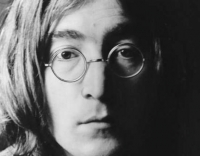
John Winston Ono Lennon, MBE (born John Winston Lennon; October 9, 1940 – December 8, 1980) was an English rock musician, singer, songwriter, artist, and peace activist who gained worldwide fame as one of the founding members of The Beatles. As a member of the group, Lennon was one of the lead vocalists and co-wrote many of the band's songs with Paul McCartney.
In his solo career, Lennon wrote and recorded songs such as "Give Peace a Chance" and "Imagine". Lennon revealed his rebellious nature and wit on television, in films such as A Hard Day's Night, in books such as In His Own Write, and in press conferences and interviews. He was controversial through his work as a peace activist, artist, and author.
Lennon had two sons: Julian Lennon, with his first wife Cynthia Lennon, and Sean Ono Lennon, with his second wife, avant-garde artist Yoko Ono. After a self-imposed retirement from 1976 to 1980, Lennon reemerged with a comeback album, but was murdered one month later in New York City on 8 December 1980. In 2002, respondents to a BBC poll on the 100 Greatest Britons voted Lennon into eighth place. In 2004, Rolling Stone magazine ranked Lennon number 38 on its list of "The Immortals: The Fifty Greatest Artists of All Time" and ranked The Beatles at number one.
In his solo career, Lennon wrote and recorded songs such as "Give Peace a Chance" and "Imagine". Lennon revealed his rebellious nature and wit on television, in films such as A Hard Day's Night, in books such as In His Own Write, and in press conferences and interviews. He was controversial through his work as a peace activist, artist, and author.
Lennon had two sons: Julian Lennon, with his first wife Cynthia Lennon, and Sean Ono Lennon, with his second wife, avant-garde artist Yoko Ono. After a self-imposed retirement from 1976 to 1980, Lennon reemerged with a comeback album, but was murdered one month later in New York City on 8 December 1980. In 2002, respondents to a BBC poll on the 100 Greatest Britons voted Lennon into eighth place. In 2004, Rolling Stone magazine ranked Lennon number 38 on its list of "The Immortals: The Fifty Greatest Artists of All Time" and ranked The Beatles at number one.
Real Book

The Real Book refers to compilations of lead sheets for jazz standards. It usually refers to the first volume of a series of books transcribed and collated by Berklee College of Music students during the 1970s.The name is derived from "fake books", so called because they contained only rough outlines of music pieces rather than fully notated scores. Early fake books were often used by professional bands who performed mostly standards, often more geared to society and dance bands rather than jazz ensembles, and devoted much space to show tunes, novelty tunes, traditional jazz, etc. The first three Real Book volumes, in contrast, contained many bebop and other jazz standards that were likely to be encountered on jazz gigs at the time. For this reason, the books were quickly adopted among jazz players in the 1970s, particularly on the east coast.
Garou
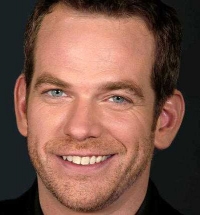
Pierre Garand, known by his stage name Garou, is a Canadian singer and entertainer from Sherbrooke, Québec. He is known for his work in the musical Notre-Dame de Paris and the No. 1 hits "Belle", "Seul", "Sous le vent", and "La Rivière de notre enfance".
M. Francisco, SJ
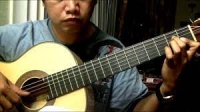
M. Francisco, SJ composer Louie Ocampo is an uncle, who taught Manoling to play organ.
Hercules
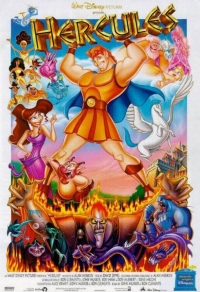
Hercules is a 1997 American animated musical feature film, produced by Walt Disney Feature Animation and released by Walt Disney Pictures on June 27, 1997. The thirty-fifth animated feature in the Disney animated features canon, the film was directed by Ron Clements and John Musker. This movie was based on the legendary Greek mythology hero Heracles (known in the film by his Roman name, Hercules), the son of Zeus, in Greek mythology. The storyline also draws inspiration from The Karate Kid, Rocky, Superman: The Movie, and Superman II.
Though Hercules did not match the financial success of Disney's early-1990s releases, the film made $99 million in revenue in the United States during its theatrical release and $252,700,000 worldwide. The film is part of the Disney Renaissance that started in 1989 and ended in 1999. Hercules was later followed by the direct-to-video prequel Hercules: Zero to Hero, which served as a prequel to Hercules: The Animated Series, a syndicated Disney TV series focusing on Hercules during his time at the Prometheus academy.
Though Hercules did not match the financial success of Disney's early-1990s releases, the film made $99 million in revenue in the United States during its theatrical release and $252,700,000 worldwide. The film is part of the Disney Renaissance that started in 1989 and ended in 1999. Hercules was later followed by the direct-to-video prequel Hercules: Zero to Hero, which served as a prequel to Hercules: The Animated Series, a syndicated Disney TV series focusing on Hercules during his time at the Prometheus academy.
Les Miserables
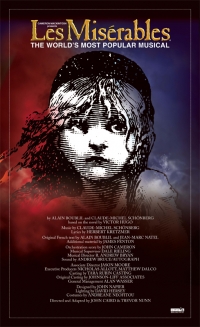
Les Misérables, colloquially known as Les Mis or Les Miz, is a musical composed in 1980 by the French composer Claude-Michel Schönberg with a libretto by Alain Boublil. Sung through, it is perhaps the most famous of all French musicals and one of the most performed musicals worldwide. On October 8, 2006, the show celebrated its 21st anniversary and became the longest-running West End musical in history and is still running (though it has changed venues).
Among the most famous songs of this Tony award-winning musical are "I Dreamed a Dream", "One Day More", "A Heart Full of Love", "Stars", "Bring Him Home", "Do You Hear the People Sing?", "Master of the House", and "On My Own."
The musical is based on the 1862 novel Les Misérables by Victor Hugo. Set in early 19th century France, it follows the intertwining stories of a cast of characters as they struggle for redemption and revolution. The characters include a paroled convict named Jean Valjean who, failing attempts to find work as an honest man with his yellow ticket of leave, breaks his parole and conceals his identity; the police inspector Javert who becomes obsessed with finding Valjean; Fantine, the single mother who is forced to become a prostitute to support her daughter; Cosette, who eventually falls in love with a French student named Marius Pontmercy. After Fantine dies, Cosette becomes Jean Valjean's adopted daughter; the Thénardiers, the unscrupulous innkeepers who thrive on cheating and stealing; Éponine, their young daughter who is hopelessly in love with Marius; Gavroche, a young beggar boy; and student leader Enjolras who plans the revolt to free the oppressed lower classes of France. The main characters are joined by an ensemble that includes prostitutes, student revolutionaries, factory workers, and others.
Among the most famous songs of this Tony award-winning musical are "I Dreamed a Dream", "One Day More", "A Heart Full of Love", "Stars", "Bring Him Home", "Do You Hear the People Sing?", "Master of the House", and "On My Own."
The musical is based on the 1862 novel Les Misérables by Victor Hugo. Set in early 19th century France, it follows the intertwining stories of a cast of characters as they struggle for redemption and revolution. The characters include a paroled convict named Jean Valjean who, failing attempts to find work as an honest man with his yellow ticket of leave, breaks his parole and conceals his identity; the police inspector Javert who becomes obsessed with finding Valjean; Fantine, the single mother who is forced to become a prostitute to support her daughter; Cosette, who eventually falls in love with a French student named Marius Pontmercy. After Fantine dies, Cosette becomes Jean Valjean's adopted daughter; the Thénardiers, the unscrupulous innkeepers who thrive on cheating and stealing; Éponine, their young daughter who is hopelessly in love with Marius; Gavroche, a young beggar boy; and student leader Enjolras who plans the revolt to free the oppressed lower classes of France. The main characters are joined by an ensemble that includes prostitutes, student revolutionaries, factory workers, and others.
Isaac Albeniz

Isaac Albéniz i Pascual (Spanish pronunciation: ) (May 29, 1860 – May 18, 1909) was a Spanish pianist and composer best known for his piano works based on folk music.
Albéniz’ Suite Española Op.47 is comprised mainly of pieces written in 1886, and grouped together in 1887 in honor of the Queen of Spain. Like many of Albéniz' piano pieces, these works are miniature tone pictures of different geographical regions and musical idioms of Spain. The eight original titles are Granada, Cataluna, Sevilla, Cadiz, Asturias, Aragon, Castilla and Cuba but only the first three titles and Cuba appeared in the original collection. The other pieces were published in later collections, often with different titles. The publisher Hofmeister published all eight titles of Suite Espanola in 1911 after Albéniz’ death, appropriating other pieces for the other four titles so those pieces do not always accurately reflect the geographic designation of the titles, most obviously in the case of Asturias (Leyenda) whose Andalusian flamenco rhythms bear little resemblance to the music of the northern province Asturias. The opus number 47 assigned by Hofmeister has no relation to any chronological order in Albéniz’ oeuvre, in which opus numbers were randomly given by publishers or by Albéniz himself, with some pieces appearing in more than one collection.
Albéniz’ Suite Española Op.47 is comprised mainly of pieces written in 1886, and grouped together in 1887 in honor of the Queen of Spain. Like many of Albéniz' piano pieces, these works are miniature tone pictures of different geographical regions and musical idioms of Spain. The eight original titles are Granada, Cataluna, Sevilla, Cadiz, Asturias, Aragon, Castilla and Cuba but only the first three titles and Cuba appeared in the original collection. The other pieces were published in later collections, often with different titles. The publisher Hofmeister published all eight titles of Suite Espanola in 1911 after Albéniz’ death, appropriating other pieces for the other four titles so those pieces do not always accurately reflect the geographic designation of the titles, most obviously in the case of Asturias (Leyenda) whose Andalusian flamenco rhythms bear little resemblance to the music of the northern province Asturias. The opus number 47 assigned by Hofmeister has no relation to any chronological order in Albéniz’ oeuvre, in which opus numbers were randomly given by publishers or by Albéniz himself, with some pieces appearing in more than one collection.
Joe Hisaishi

Mamoru Fujisawa (藤澤 守 Fujisawa Mamoru?), known professionally as Joe Hisaishi (久石 譲 Hisaishi Jō?, born December 6, 1950), is a composer and director known for over 100 film scores and solo albums dating back to 1981.
While possessing a stylistically distinct sound, Hisaishi's music has been known to explore and incorporate different genres, including minimalist, experimental electronic, European classical, and Japanese classical. Lesser known are the other musical roles he plays; he is also a typesetter, author, arranger, and head of an orchestra.
He is best known for his work with animator Hayao Miyazaki, having composed scores for many of his films including Nausicaä of the Valley of the Wind (1984), My Neighbor Totoro (1988), Princess Mononoke (1997), Spirited Away (2001), Howl's Moving Castle (2004) and Ponyo (2008). He is also recognized for the soundtracks he has provided for filmmaker 'Beat' Takeshi Kitano, including Dolls (2002), Kikujiro (1999), Hana-bi (1997), Kids Return (1996), Sonatine (1993).
While possessing a stylistically distinct sound, Hisaishi's music has been known to explore and incorporate different genres, including minimalist, experimental electronic, European classical, and Japanese classical. Lesser known are the other musical roles he plays; he is also a typesetter, author, arranger, and head of an orchestra.
He is best known for his work with animator Hayao Miyazaki, having composed scores for many of his films including Nausicaä of the Valley of the Wind (1984), My Neighbor Totoro (1988), Princess Mononoke (1997), Spirited Away (2001), Howl's Moving Castle (2004) and Ponyo (2008). He is also recognized for the soundtracks he has provided for filmmaker 'Beat' Takeshi Kitano, including Dolls (2002), Kikujiro (1999), Hana-bi (1997), Kids Return (1996), Sonatine (1993).
Dimitri Tiomkin
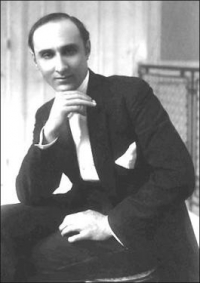
Dimitri Zinovievich Tiomkin (Ukrainian: Дмитро Зиновійович Тьомкін) (10 May 1894 – 11 November 1979) was a Ukrainian-born and Oscar-winning composer. Along with Max Steiner, Miklós Rózsa and Franz Waxman, he is one of Hollywood's most prolific film score composers. Tiomkin Kremenchuk was born in Ukraine and attended the Saint-Peterburg Conservatory in Russia. He studied piano with Felix Blumenfeld and harmony and counterpoint with Alexander Glazunov. He became one of the leading organizers of the third anniversary celebrations of the October Revolution in 1920.
C-Cedille
C-Cedille Musical artist Songs honey&clove Lord Save the Queen Fuminsyou
Dusty Springfield
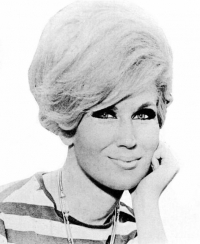
Mary Isobel Catherine Bernadette O'Brien OBE (16 April 1939 – 2 March 1999), professionally known as Dusty Springfield, was a British singer and record producer whose career extended from the late 1950s to the 1990s. With her distinctive mezzo-soprano sound, she was a significant singer of blue-eyed soul, pop and dramatic ballads, with French chanson, country and jazz also in her repertoire. During her 1960s peak she ranked among the most successful British female performers on both sides of the Atlantic and her image – marked by a peroxide blonde bouffant/beehive hairstyle, heavy makeup (thick black eyeliner and eye shadow) and evening gowns, as well as stylised, gestural performances – made her an icon of the Swinging Sixties.
Tim Blickhan
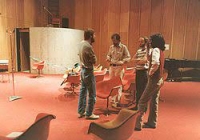
Tim BlickhanDr. Charles T. (Tim) Blickhan joined the faculty of the Northern Illinois University School of Music in 1976 and retired in June, 2011. For twenty years he was Coordinator of the Theory & Composition Area. In 1996, he assumed the position of Coordinator of Graduate Studies, and added additional administrative duties as Assistant Director of the School of Music in 2001. He was Director of Music for First Congregational United Church of Christ in DeKalb from 1993 - 2007.
A trombonist and vocalist, he received the B.S. in Education from Northeast Missouri State Teachers' College (now Truman State University) in 1967, and taught instrumental and vocal music in the public schools of several Missouri communities before entering military service. After receiving his discharge from the army, he attended the University of Illinois from 1973-76, where he earned the Master of Music and Doctor of Musical Arts in Composition, studying primarily with Ben Johnston.
A trombonist and vocalist, he received the B.S. in Education from Northeast Missouri State Teachers' College (now Truman State University) in 1967, and taught instrumental and vocal music in the public schools of several Missouri communities before entering military service. After receiving his discharge from the army, he attended the University of Illinois from 1973-76, where he earned the Master of Music and Doctor of Musical Arts in Composition, studying primarily with Ben Johnston.
Nino Rota

Nino Rota (December 3, 1911, Milan – April 10, 1979, Rome) was a world-renowned Italian composer and academic who is best known for his film scores, notably for the films of Federico Fellini and Luchino Visconti. He also composed the music for two of Franco Zeffirelli's Shakespeare films, and for the first two films of Francis Ford Coppola's Godfather trilogy.
During his long career Rota was an extraordinarily prolific composer, especially of music for the cinema. He wrote more than 150 scores for Italian and international productions from the 1930s until his death in 1979—an average of three scores each year over a 46 year period, and in his most productive period from the late 1940s to the mid-1950s he wrote as many as ten scores every year, and sometimes more, with a remarkable thirteen film scores to his credit in 1954. Alongside this great body film work, he composed ten operas, five ballets and dozens of other orchestral, choral and chamber works, the best known being his string concerto. He also composed the music for many theatre productions by Visconti, Zeffirelli and Eduardo de Filippo as well as maintaining a long teaching career at the Liceo Musicale in Bari, Italy, where he was the director for almost 30 years.
During his long career Rota was an extraordinarily prolific composer, especially of music for the cinema. He wrote more than 150 scores for Italian and international productions from the 1930s until his death in 1979—an average of three scores each year over a 46 year period, and in his most productive period from the late 1940s to the mid-1950s he wrote as many as ten scores every year, and sometimes more, with a remarkable thirteen film scores to his credit in 1954. Alongside this great body film work, he composed ten operas, five ballets and dozens of other orchestral, choral and chamber works, the best known being his string concerto. He also composed the music for many theatre productions by Visconti, Zeffirelli and Eduardo de Filippo as well as maintaining a long teaching career at the Liceo Musicale in Bari, Italy, where he was the director for almost 30 years.
Scarlatti
Giuseppe Domenico Scarlatti was an Italian composer. He is classified primarily as a Baroque composer chronologically, although his music was influential in the development of the Classical style and he was one of the few Baroque composers to transition into the classical period.
 Sheet Music Mobile is a site for those who wants to access popular sheet music easily,
letting them download the sheet music for free for trial purposes.
It's completely free to download and try the listed sheet music, but you have to delete the files after 24 hours of trial.
Don't forget, if you like the piece of music you have just learned playing,
treat the artist with respect, and go buy the original sheet music.
Sheet Music Mobile is a site for those who wants to access popular sheet music easily,
letting them download the sheet music for free for trial purposes.
It's completely free to download and try the listed sheet music, but you have to delete the files after 24 hours of trial.
Don't forget, if you like the piece of music you have just learned playing,
treat the artist with respect, and go buy the original sheet music.
